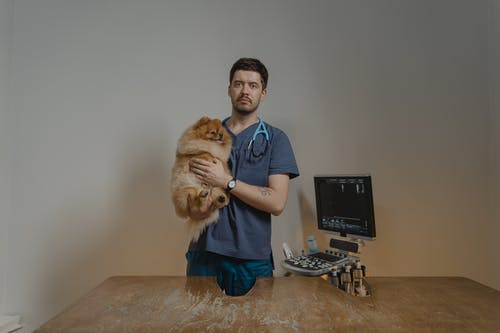Category: Veterinary

Surgical procedures can be a terrifying experience for your furry friend. Animals also need time to relax and recover after surgical treatment, just like us, and during that time, they need to be fed in a way that doesn’t upset their stomachs.
It’s normal for your dog to refuse his regular diet, especially after surgery. What you feed them and how you feed them can help them bounce back and produce a healthy digestive system after surgery. This post will go over the foods you need to give your animal companion after surgery.
Foods to Feed Your Animal Companion After Surgery
Your dog’s nutritional demands may alter after surgery, and it’s necessary to ensure they’re getting the essential nutrients to help them recover properly. Below are some food suggestions for your dog after surgery:
1. Protein
Protein is as essential to animals as it is to people. Protein’s vital amino acids not only promote healthy hair and skin growth but also help in muscle and tissue repair. Having said that, each food has a different amount of amino acids. This is why deciding on the food you feed your puppy is essential, particularly after surgery.
The best protein sources are chicken, turkey, eggs, lean ground beef, and cottage cheese. All meat must be prepared, preferably by boiling, and diced into little pieces to make it easier to digest.
Consider your furry friend’s age, activity level, overall health, and breed when deciding if a high-protein food is appropriate. Consult with your veterinarian for every dog check up to select the ideal diet for each animal.
2. Omega 3
Omega-3 fatty acids are important fats commonly used as supplements for people and pets. Meals high in omega-3 fatty acids will also help your dog recover faster. These nutrients contain anti-inflammatory effects and other benefits that can help your pet’s cognitive abilities.
If you are considering changing your pet’s diet, it is advised to consult a board-certified vet nutritional expert or a primary care vet with veterinary diagnostic services who practices nutritional health.
3. Fats and Carbohydrates
Giving your pet food high in fats and carbs promotes proper post-op recovery. Fats promote cell development, and carbohydrates give energy, allowing your furry friend to resume their daily routine. Pets can benefit from digesting the simple carbs in cooked rice, pasta, and potatoes. White rice is better than brown rice since it is easier to digest for your pet. Any type of pasta is acceptable; potatoes can be white, yellow, or sweet, but they must be steamed instead of fried or raw.
Remember that these are only guidelines, and your dog may require more or less depending on its problem. See your vet to learn more about specific nutrients that your furry friend may need. You may click here for more information about post-surgery recovery.
4. Glucosamine
Although dogs’ bodies can naturally generate glucosamine, its production will gradually decrease. This is why elderly pets who undergo surgery recover more slowly. This substance is in charge of maintaining dogs’ joints and cartilage strong and healthy.
Getting back to normal takes more time for elderly pets since their bodies generate less glucosamine. While they are still suffering from the surgery results, this also signifies that it will take a while for them to restore their normal appetite after it.
5. Home Cooked Meals
Food from the supermarket has benefits, but it’s preferable to cook for your furry friend in your home so you know exactly what they’re getting. Having a thorough understanding of its components will enable you to help your dog heal by providing the proper ingredients.
These are just some general standards to help you decide what to feed your dog after surgery. The ideal means to choose your pet’s food is to consult your vet.

Typically, owners cannot take their dogs on vacation. If a friend will not pet-sit your dog, you must kennel it. Even though most kennels give the dogs they board excellent care, kennel stress can still happen. Pet owners can take a few steps to make their dogs feel more at ease while staying at a kennel.
How to Prevent Kennel Stress When Boarding Pets
Even one night in a boarding kennel may cause anxiety in your dog, and more extended stays may exacerbate their stress levels. While not all dogs go through kennel stress, it is a common and unpleasant occurrence for most dogs and a very stressful situation for their owners. If you think your pet still seems upset or stressed, visit a pet hospital in Clarksville, TN, to get your pet checked.
Prepare Your Pet
The confinement of a dog in a kennel can be very stressful because they are used to roaming the house and going wherever they please. To help the dog feel less anxious, the owner can start getting ready for the visit. Your dog can be trained for kennel time using a crate, kennel, or small bedroom at home.
Avoid Separation Anxiety
An anxious dog may become upset when separated from its owner or other dogs. A few weeks before leaving, the owner should spend a certain number of hours each day away from the dog. If the owner has more than one dog, separating them for a few hours each day is best to help them get used to being apart.
Visit the Facility
Every dog’s behavior is unknown to anyone who manages a dog kennel. The personalities and preferences of dogs vary greatly. The owner should visit the kennel and ask about their boarding services before departing to discuss their dog’s temperament. The dog’s accommodations will be better the more information the kennel owner has about the dog.
Bring Something Familiar
Bring something cozy and familiar to the kennel to aid in the dog’s relaxation. This could be a blanket, stuffed animal, or anything your dog associates with you. The dog will feel less anxious if familiar objects are around him.
When being boarded, many dogs exhibit anxiety. The owner should be familiar with a few preparation methods to help the dog feel less anxious while staying at the kennel.
Four Factors That Cause Kennel Stress
Changes in diet and routine, dog aggression, and introducing new sounds, smells, and people can make your dog anxious. Changes in familiar and unfamiliar surroundings can frighten even the calmest dogs.
Routine Modifications
Dogs are creatures of habit, so changing their routine can make them unhappy. Your dog’s routines for eating, sleeping, and exercising in a kennel will change.
Unfamiliar Individuals
Although most dogs love interacting with people, some are apprehensive of strangers. In a kennel, the caregiver might change every hour, which makes the dogs more stressed.
Lack of Regular Exercise
A dog’s stress level increases when he does not burn enough calories. A dog’s anxiety during boarding may worsen if they do not exercise enough or refuse to play in the kennel’s outdoor areas.
A Sudden Shift in Diet
A dog may get sick if it eats something strange, but it might also get anxious if its routine is disturbed. Diet is essential for dogs because it supports a robust immune system. If your dog stops eating, their nutritional status will deteriorate.
If you have an exotic pet, you should be aware that finding an exotic animal vet qualified to care for them is critical. Look up “exotic veterinarian near me” to get the best care for your pet.
Conclusion
Despite our best efforts to reassure dogs, the kennel environment is frequently so different from their home that they feel anxious. Your dog will feel more at ease while boarded if you consider the above advice.

Dogs might get ill with pneumonia or other respiratory diseases, similar to people. Having said that, if you aren’t familiar with the specific symptoms to keep an eye out for, it may not be instantly noticeable that your dog has a problem. Before we get into that, though, what is pneumonia? Pneumonia is defined by inflammation of the air sacs and the surrounding tissue of the lungs. High fever, coughing, and shortness of breath are common indicators of this condition.
So what happens when a dog gets pneumonia? Let’s look at what causes pneumonia in dogs and how to treat it.
What Causes Pneumonia in Dogs?
Dogs get pneumonia when there is inflammation in their lower respiratory system or lungs. This inflammatory reaction can be caused by microorganisms, fungi, parasites, or viruses, among other things. Most of the time, bacterial or viral pneumonia is caused by another illness, like bronchitis, kennel cough, or parainfluenza.
Bronchitis
When a dog has bronchitis, it normally starts with a dry, hacking cough that can last for up to two months. Canine bronchitis can be caused by various factors, such as an infection in the respiratory system or breathing in chemicals or other allergens, including cleaning products. Other allergens, like powdered feed products, room deodorizers, as well as house dust, can also cause bronchitis, which can become pneumonia if it isn’t addressed.
The most effective way to help your dog avoid bronchitis is to keep your home free of dust and chemical fumes that get into the air.If you feel your dog has a bronchial issue, you should take it to the veterinary emergency nearby for an examination and treatment right away before it becomes life-threatening.
Kennel Cough
Kennel cough is a common disease that dogs can get from being close to other pet dogs, like in a boarding kennel. Keeping your dog away from these environments is the best approach to avoid this condition.
In addition, the bacterium Bordetella frequently referred to as “kennel cough,” can be prevented by providing your dog with a preventative vaccination. Two dosages are given two to four weeks apart, followed by a booster dose six months to a year later. On the other hand, veterinary facilities like Kay Animal Hospital can help you give your dog the vaccines it needs to avoid contracting kennel cough.
Parainfluenza
Canine influenza or greyhound illness are all other names for parainfluenza. It’s highly contagious between canines and, if untreated, can be deadly. Dog owners often mistake it for kennel cough, which could worsen the dog’s pneumonia if not treated properly. So, if you want to protect your dog from parainfluenza, you should get them vaccinated, but only after speaking with your Douglasville vet.
The Importance of Pneumonia Prevention
Preventing pneumonia in your canine has lots of positive side results, the first and foremost being a much healthier dog. It is vital to make sure your dog is current on vaccinations, eating a well-balanced diet regimen, and getting plenty of exercise before spending time in a kennel or around other pets.
Furthermore, when your dog is in good shape, you’ll find that preventative care at the veterinarian’s clinic is much more cost-effective than treating pneumonia, which can be very pricey, especially if your dog needs to spend time in the healthcare facility.
Conclusion
Pneumonia in dogs is a life-threatening disease that needs immediate vet care. You can help protect your dog from this respiratory infection by being aware of the indications and taking preventative action. A rapid medical diagnosis and treatment plan are crucial for your dog’s recovery if your pet contracts pneumonia.

The role of a pet owner entails not just taking care of them but also making sure they’re happy and healthy. This includes regular veterinary visits along with healthy food choices and physical activity. Vaccination is among the essential elements of pet care. Vaccination prevents cats from potentially deadly diseases and could even save their lives.
How Do Vaccines Function, and Why Are They So Important?
Animal vaccination stimulates your pet’s immune system, allowing it to recognize and combat certain infections. They include a trace percentage of the pathogen’s viruses or bacteria, which causes the immune system to generate antibodies. These antibodies stay in your pet’s system, protecting against the disease if they are exposed to the same pathogen again. Vaccines assist in preventing sickness and help keep your pet healthy. In this post, we’ll look at the importance of vaccinations in pet internal medicine and why you should make immunization an essential part of your pet.
Vaccines Safeguards Pet’s General Health
Vaccination helps protect your pet against various dangerous diseases, such as parvovirus, rabies, and distemper. These diseases are highly contagious and can cause death. Vaccinating your pet does more than protect them; it also helps ensure that illness is not spread to other pets and humans.
Some vaccines, such as the rabies vaccine, are required by law, while others are optional. On the other hand, getting your pet immunized against diseases such as feline leukemia and kennel cough will help maintain their overall health. These diseases can compromise your pet’s immune system, which makes them more vulnerable to other illnesses. Contact professionals at a vet in Mc Allen, TX, to learn more about the services offered.
Vaccines Are Safe and Effective
Before they are approved for use, they are thoroughly studied and monitored to ensure their safety and effectiveness. They’re designed to boost your pet’s immune system so that it can recognize and fight against specific diseases. Although vaccinations can trigger small-scale side effects like discomfort at the injection site and a minor fever, they are much less risky than contracting the disease. Book an appointment to learn more information about their services.
Vaccines Help Save Money
Immunization against diseases is significantly cheaper than treating a sick pet. Treating diseases such as distemper or parvovirus can be costly and require hospitalization and intensive care. Vaccines, on the contrary of the hand, are an inexpensive approach to preserving your pet’s health and avoiding hefty medical expenditures to come up.
Vaccines Contribute to Public Health Protection
Certain animal diseases, such as rabies, can affect humans. Vaccinating pets against rabies protects them and helps to avoid transmission to humans. This is essential when you live in a zone that is rabidly infested.
Conclusion
Finally, immunizations play crucial roles in pet internal health treatment. They’re safe and effective in protecting your pet from potentially fatal infections. Vaccines do more than protect your pet’s health; they also protect the general population’s health by preventing disease spread. Your duty as a responsible pet owner is to ensure that your pet’s vaccines are updated. Contact your veterinarian to select the best vaccination schedule appropriate for your pet and ensure they are safe for many years.
Always remember that prevention is more effective than treatment, and immunizations are efficient for keeping your pet healthy. Invest in your pet’s health by giving them the best chances to live a healthy life.

Reasons to Avail of a Pet Wellness Plan
Are you curious why more pet owners are signing up for wellness plans? You may purchase wellness plans for your pet to secure their health and encourage preventative treatment from various pet insurance providers and veterinary groups. Depending on your pet’s age, there are a wide variety of pet wellness plans from which to choose.
You may learn more about the critical elements of a solid pet wellness plan from this article.
What Is a Pet Wellness Plan?
One benefit of a pet wellness plan is reimbursement for routine and preventative veterinary care. These programs enable the potentially high preliminary cost of preventative pet care to be disbursed over time. Pet wellness programs, unlike pet insurance, cover the expense of preventative treatment. Learn more about these plans by clicking here.
Here are the other benefits of having a wellness plan:
Help You Budget Better and Save More
Regular veterinary visits could be more expensive without the plan. As Wellness Plans are ‘bundles’ of veterinary treatments, there will be less financial strain when you bring your pet in for the preventative care services the veterinarian advises.
With this payment option, more pet owners may afford the complete veterinary care and avoid potentially high treatment expenses for issues that could have been prevented but went untreated. It is possible to include discounts and other complimentary services in the plan.
Preventive Care and Screening
Prevention is necessary for keeping pets healthy because it is less costly and complicated than treating illnesses and diseases. Treatment of parasites helps prevent pain, severe health issues, and further vet expenses. Routine blood tests can help detect and cure fatal diseases. These preventative care options ensure the highest level of pet welfare and enable pet owners to save future medical costs.
Always Be Ready for Emergencies
Although pet owners detest the idea of their animals becoming hurt or unwell, it’s essential to be ready. When looking for emergency treatment for your dog or cat, many wellness plans provide a predetermined number of vet exams as part of the package.
Does the Wellness Plan Cover Geriatric Care?
As dogs age, their risk of illness and disease increases. A wellness plan may help by spending on annual wellness checks and diagnostic procedures, such as blood work, liver function testing, and fecal and urine screening. Senior cat care will enable early detection of any emerging health issues.
Is a Wellness Plan the Same As Insurance Policy?
It’s vital to understand that wellness plans are different from insurance. Insurance is primarily geared toward emergency and persistent health difficulties, whereas wellness care packages are focused on fundamental, preventative treatment. This covers treatments like immunizations, routine lab work, other procedures to stop future illnesses, and dental work. Click here if you’re looking for a dog dentist.
These procedures are often not covered by standard pet insurance; several insurers provide pet wellness as an add-on.
Conclusion
If you’re a newbie pet owner, you might be surprised how much routine veterinary care can cost. A good pet wellness plan guarantees you’re ready to care for the essentials and your new companion ahead of time. Many feel reassured when vets learn that a pet parent has bought a wellness plan. Veterinarians don’t worry about the financial aspect of the situation since they are sure they can give your pet the finest care possible.

A vet surgical procedure might help address a variety of disorders in your beloved dog companions, yet it does require a time of healing following the treatment. As a result, taking specific steps to guarantee that your puppy’s recuperation process is safe and pleasant is critical. Additionally, you should be diligent in ensuring that your pet’s wound is healing properly and that no further problems emerge. So, how can you guarantee that your dog heals appropriately after surgery?
How to Help Your Dog’s Surgical Wound Heal Faster
Canine surgery may be a terrifying and unpleasant experience for animal owners and their pets. However, it does not need to be if the proper preparations are taken. Taking adequate care of your pet’s surgical incision can allow it to recuperate quickly and without issues. Your dog might recuperate quickly and return to its regular self with the correct treatment. Below are a few tips to help your dog heal faster after surgery:
1. Feed them nutritious foods.
A healthy diet is critical for your dog’s recovery. Therefore, make sure to provide your canines with a balanced meal rich in protein and low in fat to have the energy and nourishment they need to recover. You must try adding vitamins, minerals, and other immune-boosting ingredients to your pet’s diet. This will certainly help their recuperation and battle any infections that might emerge while recovering.
Additionally, if your pets go through oral surgery due to dog teeth problems, give them soft and small portions of food, as their mouths will still be sore, and they will have a problem eating bigger pieces. This will help them obtain the proper nourishment and decrease the discomfort and strain that chewing can trigger.
2. Take your pets to the vet regularly for examinations.
Taking your dog to the vet for regular examinations after surgery is crucial. The vet might look at the animal for symptoms of infection, keep track of the recovery process, and offer additional treatment if required. In addition, it is crucial to follow the vet’s post-surgery care recommendations. If you have senior canines with surgical treatment, you need to take special care of them and guarantee they get all their medications as recommended. This will ensure your dog’s recovery is as easy and quick as possible. You can explore the web to read more about geriatric pet care.
3. Make sure that your canine obtains sufficient rest.
Rest is essential in any recuperation, and your dog will require lots after surgery. You should build a peaceful, pleasant home setting where your pet can sleep undisturbed and offer adequate soft bedding to keep them comfy while they recover. In addition, you should give your puppy at least eight to ten hours of peaceful sleep each day and make sure they are not disturbed throughout this period. You must monitor your canine’s sleeping patterns during healing to guarantee they are resting well.
4. Keep the surgical wound clean and dry.
Understanding the significance of keeping the surgery incision clean and dry is crucial. This might help avoid infection and reduce the danger of future problems such as extreme bleeding and prolonged healing. When changing the dressing on the wound, you may apply antiseptic treatments recommended by a surgeon for pets and wrap it with a bandage to give an added layer of protection. Additionally, it is crucial to check the wound often for signs of infection, such as redness, swelling, and discharge. If these signs show up, get veterinary help right away to stop the infection from continuing.

Canines’ dental health is an essential component of their general wellness. Canines may suffer from significant oral issues such as foul breath, periodontal illness, and dental caries if they are not appropriately cared for and kept. Animal owners may take preventative measures to keep their pet’s teeth and gums healthy. This is needed to enhance their canines’ dental health and avoid more significant illnesses in the future. So, how should you care for your dog’s teeth?
How to Keep Your Dog’s Teeth Clean
Keeping your pet’s teeth clean is an essential element of pet care. Poor dental hygiene in pets may cause various dental and wellness problems, including infection, missing teeth, and other major medical ailments. As a result, you must develop and maintain proper dental hygiene habits for your pets to keep their teeth clean and healthy. Here are a few pointers to keep your pet’s teeth clean and healthy.
1. Provide your pet with oral chews or playthings.
Oral chews and toys stimulate your dog’s gums, which helps get rid of plaque and tartar build-up. However, these items need to be mainly designed for canines and made from rubber, nylon, or similar hard material that may be chewed without providing a choking danger. If these chews or toys get torn or damaged, little pieces of the material might quickly become caught in your pet’s throat. Therefore, get chews and toys ideal for your dog’s size, weight, and chewing tendencies.
2. Brush your pet’s teeth regularly.
Brush your dog’s teeth twice a week using a toothbrush and toothpaste made solely for pets. It is essential to start brushing your pet’s teeth as early as possible to establish a routine. Furthermore, you must watch out for indicators of infection or oral issues in your dog’s mouth, such as discolored teeth, inflamed gums, bad breath, frequent drooling, and difficulty eating.
Suppose your dogs are suffering from periodontal disease or other oral problems. In that case, your vet may recommend a professional teeth cleaning and even oral surgery if needed. Some vet facilities also offer boarding solutions for dogs recovering from dental surgeries, giving owners peace of mind knowing their precious pets are in a safe and secure environment. You can visit websites like lovinghands.com for more information about pet boarding.
3. Get regular veterinary dental examinations.
Regular pet dental check-ups are essential to keep your dog’s teeth and gums healthy and detect any oral irregularities early on before they get more severe. Routinely inspecting and cleaning your pet’s teeth can help prevent oral issues such as periodontal disease, which can lead to other major health issues.
Some vet facilities also offer other services like pet vaccination and parasite prevention, which are essential for your pet’s health. Routine visits to these facilities will help pinpoint any changes in your dog’s health early, permitting you to interfere and treat the issue before it becomes more serious.
4. Monitor your dog’s diet regimen.
Picking dog foods with the right mix of minerals and vitamins and avoiding meals with a lot of sugar can help your pet’s oral health. Eating the right food and avoiding unhealthy snacks can keep your pet’s teeth and gums healthy. Frequently examining your dog’s food label can help guarantee your dog obtains the necessary nutrients. This can be especially important for senior dogs, as they may require additional nutrients to support their aging bodies. You can follow this link for more veterinary services you can get.

Veterinarians are the only medical professionals in the world today trained to protect the health of animals and humans. They exert substantial effort to meet every animal type’s health and welfare requirements. Securing the environment, performing research, guaranteeing food safety, and ensuring public health are all vital areas in which veterinarians play.
Salient Veterinarian’s Roles and Duties
A veterinarian resembles a pediatrician in a lot of ways. Like infants and toddlers, animals lack the language abilities to explain their physical discomfort. Like a pediatrician would receive from a child’s parents, vets rely heavily on their owners for details about their pets’ health. A vet’s responsibilities are comparable to those of a pediatrician because they may include the following:
Internal and Diagnostic Options
Diseases and disorders affecting an animal’s internal systems are the primary focus of internal veterinary medicine. Heart, brain, and nerve system health problems, as well as reproductive and intestinal concerns, and cancer, are all within the vet’s purview of competence. Some of the best veterinary healthcare facilities, like Pine Grove Animal Clinic for pets, offer a wide array of diagnostic options and complementary or alternative treatments. They are adept at handling patients with a range of conditions.
Wellness Plans and Programs
Many veterinary medical facilities and clinics provide a pet wellness plan for cats and dogs that cover all the bases. Exams at the veterinarian should be annual or biannual, and they should include a comprehensive physical, core immunizations, bloodwork, and heartworm testing. A bowel evaluation and a year’s supply of flea, tick, and heartworm preventatives are also part of the package.
You can save money and better organize your finances since wellness plans “package” all the preventive services that keep your pet healthy throughout the year into a simple monthly payment plan. You should consider your pet’s yearly wellness examination a complete checkup for your furry friend. They let you monitor your pet’s food and see any indications of illness early, so you can provide them the care they need.
Preventive Care
Exotic pets, such as birds, can gain from preventative veterinarian care just as much as domesticated animals like cats and dogs. Veterinarians have the education and experience to handle these animals’ unique husbandry requirements and medical needs.
In addition, at the first wellness checkup, vets will evaluate your pet’s housing, dietary, and care requirements in depth. The vet will do a substantial health examination. Before addressing your questions, they can talk about and prescribe health screening tests and vaccines, as well as discuss health or behavior troubles and any husbandry concerns. Your pet’s and your family’s needs will be taken into account when you receive personalized recommendations. You can follow various dental clinics online to learn about their services and visit their website as well.
Key Points
The majority of people presume that a veterinarian’s clinical work includes the prevention, remedy, or relief of pain and the treatment of injuries in animals, specifically domestic animals, because this is the traditional definition of a vet. While these duties are not to be taken lightly, modern veterinarians are accountable for many activities, not only those readily apparent to the public. As the world becomes more linked and sophisticated, so are the many needs placed on veterinary experts.

Felines are susceptible to both internal and external parasites. Cat parasites might not make for a good dinner discussion, but you should know them and discuss them with your vet. These invading invaders may live in your cat’s body without your knowledge up until his symptoms increase.
Vets are constantly available to provide further info on cat parasites so that you can secure your cherished cat from exposure.
Internal Parasites of Cats
Cats are susceptible to several common internal or digestive tract parasites. Unattended, they can cause health and long-term problems, regardless of their evident security. These parasites consist of roundworms, tapeworms, hookworms, and heartworms.
- Kitties are frequently affected by roundworms. They can grow quickly and impact the growth of your feline. Digestive roundworms are responsible for digestive distress, diarrhea, and throwing up. Infected cats can spread roundworms to other felines through their feces.
- Tapeworms in felines are white, flat worms that can reach an optimum length of 20 inches. Numerous pet owners might initially discover their existence in the form of rice-like pieces in the feces or vomit of their pet. Tapeworms require an intermediate flea host. A cat may end up being sick by consuming infected fleas or excrement.
The tapeworm type Echinococcus is zoonotic, suggesting that humans (and children in particular) are vulnerable to contracting tapeworms from their pets.
- Heartworm is a long, white, spaghetti-like worm that lives in the chambers of a cat’s heart (and, in some cases, lungs). Heartworm is transferred to a feline by mosquito bite, which subsequently transports heartworm larvae into circulation. Heartworms can continue to increase within a feline’s body and show lethal. Numerous felines do not display heartworm signs until they collapse and drop dead.
- Among the most extensive parasites affecting felines is the hookworm. This 1-1 1/2-inch parasite connects to the intestinal wall and feeds on blood. If not discovered in time, lots of cats will get anemia. Some pet owners find the existence of hookworm owing to skin problems or illnesses where the parasite has burrowed through the skin’s surface area.
Security Against Cat Parasites
External parasites like ticks, leptospirosis, and many other parasites may ruin a feline’s health. Understanding cat parasites is vital for preventing your pet from contracting internal parasites or illnesses transmitted by parasites.
- Please administer flea, tick, and heartworm cat & dog vaccinations to your pet, as they are intermediary carriers of numerous illnesses and internal parasites.
- Kittens are particularly prone to parasites; for that reason, they must have a thorough assessment, deworming medication, and all required vaccinations and boosters.
- Indoor felines are more secure than their outdoor equivalents.
- Tidy and vacuum your pet’s bedding often.
- Groom your pet to maintain healthy skin and fur and eliminate ticks, fleas, and other parasites and make sure to go through cat wellness exams.
To End
With preventative treatments, correct individual hygiene is essential, consisting of cleaning hands after touching pets and before consuming meals. Grooming animals assists in limiting the risk of coat contamination, and cleaning up pet feces on walks is important, given that worm eggs or larvae transfer most digestive tract worms in feces.
Prevention of parasites is necessary for the excellent maintenance of your cat or canine. Some pet parasites here can trigger zoonotic health problems transferred from animals to people. Please see your veterinarian for info on common cat parasites.

They feed upon (ectoparasites) or are a part of other animals (endoparasites). The most well-known offenders are ticks and fleas, just one problem element. Mites, lice, heartworm, and various parasites, including intestinal, are also prevalent. Parasites can lead to minor discomfort to severe illnesses that should be treated immediately and can cause severe damage to the health of your pet. Additionally, parasites can be detrimental to the health of humans. Parasites that are problematic for pets can also spread to humans and cause zoonotic infections.
Take, for example, fleas, the most frequent ectoparasite on dogs and cats. These blood-sucking insects cause dermatitis and transmit disease to humans and other animals like the tapeworm and the bacterial Bartonella, which cause Bartonellosis, often known as scratchy cat syndrome. They are not just nuisances.
What should we know about these parasites?
Ticks are as deadly as fleas are. They can cause inflammation or irritation when they stick to the pet’s skin and are next to mosquitoes as human disease carriers. Pets are susceptible to frequent infestations with a few ticks or massive infestations, which can cause swelling, anemia, and even death.
Danger From Sand Flies
Another serious issue is canine Leishmaniasis, a deadly parasite carried to dogs through bites of infected sandflies. Sandflies, however, as they are called, tend to be found in rural or wooded areas than at beaches. Different forms of Leishmaniasis may be observed in more than 80 countries, although not all use dogs as hosts. Canine Leishmaniasis is present throughout the southern part of Europe and the Middle East, North Africa, Latin America, Mexico, Central America, Asia, and northwestern China.
Heartworm Disease-Carrying Mosquitoes
Mosquito bites could be fatal for dogs, as they transmit filariasis or heartworm, two severe parasitic diseases. Heartworm illness can be present in nearly every region in the United States and many portions of Canada, in addition to the southern part of Europe and the tropics. Dogs suffer from the most dangerous parasite because it affects the heart and can harm other internal organs. If the condition isn’t dealt with, it can be fatal. Because humans aren’t natural hosts for heartworms and heartworms, incidences of heartworm infection in humans are very rare. A cat or dog’s gastrointestinal issues are immediately addressed following these conditions.
What can we do to address this issue?
A comprehensive strategy centered around the changes in your diet, lifestyle, and specific supplements is essential to eliminate an infestation of parasites. This means that we are not just providing temporary symptom relief and assisting your pet’s body heal infections caused by parasites. It also implies that once the parasites and other diseases are gone and your pet’s gut is restored, its body is strong and healthy enough to resist any new attempts to reinfect or other infections that could be opportunistic. Click here for more info.
Parasite Prevention
Veterinary medicine can prevent most parasite illnesses. Pet owners may need to know how to protect their family members and pets. First, wash your hands after handling pets and before eating. Grooming reduces coat contamination. Most intestinal worms get spread through worm eggs or larvae in pet excrement; cleaning them regularly protects humans and the natural environment. Although ectoparasite and endoparasite prevention and treatment are essential, so is a healthy lifestyle. Get advice from your vet on how to stay safe, as the dangers may vary depending on where you live.
Prophylaxis Usage
The possibility of re-infestation with fleas is likely in many parts of the world, and regular prevention with prescribed treatment is generally recommended. Although flea infestations are most prevalent in autumn and summer, research studies have shown that they can occur anytime; hence, year-round flea management is ideal for pets. Recent research has led to particular products that meet specific pet and pet owner needs. Products that contain ingredients that become active only after being inside the flea can, for instance, limit the impact of pesticides with potent effects on pets, their families, and the home. The oral products also last longer, are more convenient and minimize the likelihood of gaps in protection. A cat and dog vaccination schedule should be followed to avoid these concerns.
Spot-on Collar Products
To prevent ticks and sandfly bites on dogs and pets, insecticidal items such as chewable tablets, a spot-on, or even a collar are available. Spot-on contains a small amount of liquid with an acaricide that is applied as drops to the skin at the side of the neck of the dog and protects it from tick bites for up to a month. Acaricide collars can last for up to six months. The prevention of sand flies bites is essential in areas at high risk: the prevention of Leishmaniasis is much simpler than treatment that is not curative.
Conclusion
All pets and all cats must start a routine deworming treatment regardless of age. Most feline and canine diseases are transmitted through soil, grass, and paved surfaces. Adults should be treated at least four times a year, but young animals and those with a higher risk should get treatment more often. The wide range of formulations available can be beneficial if your pet is resistant to deworming therapy. You can chew chewable powders and tablets, and pastes that are available.










